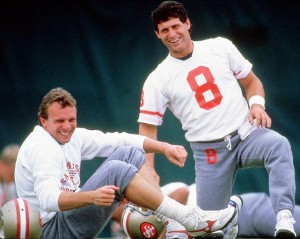Stafford has a 17-28 career record, which in light of his recent contract extension, has caused people to criticize the Lions for giving big money to a player who is not a “winner.” There are legitimate reasons to criticize Stafford, so why would people fall back on statements like this? I’m sure Lions fans wish the team had won more games under Stafford, but that’s in the past. The real question — and the one faced by Lions management before giving him the extension — is whether his current career record has any predictive value when it comes to his future record.
Since 1960, there have been 77 quarterbacks [1]Because their first seasons as starters came after age 25, I decided to eliminate Jeff Garcia, Trent Green, Warren Moon, Kurt Warner, Ed Brown, Tony Romo, Mark Rypien, and Jim Kelly from this … Continue reading who started at least 25 games in their first four seasons and then 25 more games in years five through eight. There’s some survivor bias in the sample — if you stick around for 25+ starts in years five through eight, you’re probably a pretty good quarterback — but there’s not much we can do about that. If you run a regression using winning percentage through four years as your input and winning percentage in years five through eight as your output, you get the following best-fit equation:
0.450 + 0.20 * Old Win %
The correlation coefficient is a tiny 0.04, and the p-value on the “Old Win %” variable is 0.09. Putting aside the questions of statistical significance, there is no practical effect. Stafford has a 0.377 winning percentage, which means this formula would predict him to win 52.6% of his games from 2013 to 2016. Joe Flacco won 68.75% of his games in his first four seasons; this would say he should be expected to win 58.7% of his games in years five through eight. In other words, someone with a great winning percentage should be expected to win only one more game per season than someone with a terrible winning percentage. And that’s even assuming the results are statistically significant, which many would say they are not. [2]And, of course, it doesn’t mean that that one extra win is because of the quarterback. Presumably, like in the case of Flacco, those quarterbacks who win games early are on good teams, and … Continue reading
I know some folks tend to “skim” the math section, so let’s put the advanced tools away for a second. Here are all 77 quarterbacks, listed from biggest increase in winning percentage from years five through eight compared to years one through four. Steve Young, Dan Fouts, and Bob Griese are the three quarterbacks with the biggest jumps in winning percentages. Young, for example, won just 28% of his games in years one through four (fraud!) and then 73.3% of his games in years five through eight (Hall of Famer!).
In Young’s case, he went from the worst team in the league to the best, which helps to explain why his winning percentage went through the roof. That’s also a good counter to the argument of using records to judge quarterbacks. In Stafford’s case, his mechanics have come under fire, and that’s probably a fair criticism. He obviously needs to improve, but it’s not like he was bad last year. He posted league-average rates in both NY/A and ANY/A in 2012, although he only ranked 22nd in my modified version of passer rating. With Stafford’s numbers, you have to remember that he’s nowhere near as good as his gross numbers make him appear, but that doesn’t make him a bad quarterback. He had Calvin Johnson but not much else last year, and I expect his rate numbers to bounce back in 2013. Without Titus Young and with Reggie Bush, there are reasons to expect a bounce-back year for Stafford. As for why he lost so many games last year? Well, I’ve already covered that.
References
| ↑1 | Because their first seasons as starters came after age 25, I decided to eliminate Jeff Garcia, Trent Green, Warren Moon, Kurt Warner, Ed Brown, Tony Romo, Mark Rypien, and Jim Kelly from this study. |
|---|---|
| ↑2 | And, of course, it doesn’t mean that that one extra win is because of the quarterback. Presumably, like in the case of Flacco, those quarterbacks who win games early are on good teams, and those teams are more likely to stay good than the bad teams. |

